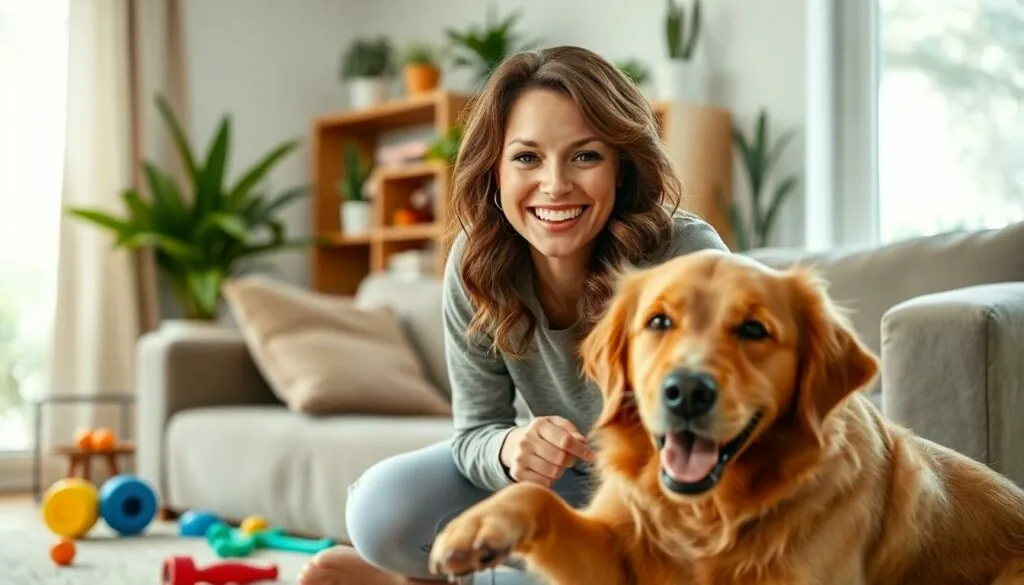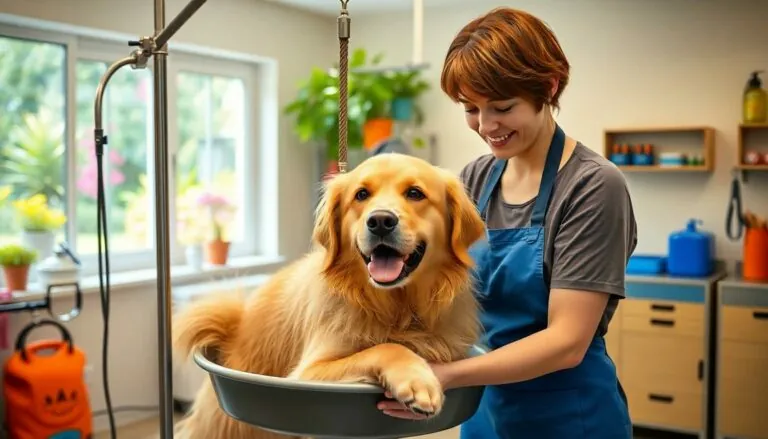Table of Contents
ToggleIn a world where pets reign supreme and homes are their playgrounds, juggling both can feel like a circus act. From furry friends knocking over potted plants to the never-ending quest for the perfect pet-friendly cleaning solution, pet and home care can be a delightful challenge. Who knew that keeping a house in order could involve dodging a tail or two?
Understanding Pet and Home Care
Managing a home while caring for pets requires a thoughtful approach. Ensuring a comfortable environment enhances the well-being of both pets and their owners.
Importance of Proper Care
Proper care for pets affects their health and happiness. Regular feeding, grooming, and exercise significantly contribute to a pet’s overall vitality. Consistent veterinary check-ups prevent health issues, safeguarding pets from illnesses. Maintaining a clean living space also reduces allergens and keeps pets safe from harmful substances. Behavioral training and socialization foster better interactions, creating harmony within the home. Prioritizing these aspects results in a balanced environment for everyone involved.
Benefits for Pets and Owners
Enhanced companionship brings joy to both pets and owners. Engaging in regular activities strengthens bonds between them. Reducing stress benefits everyone; calm pets create a more serene atmosphere. Clean homes foster safety, promoting healthier living conditions. Improved routines lead to more predictable behaviors, which makes home life easier. Overall, positive interactions create a happier household, enriching lives along the way.
Essential Pet Care Practices

Proper pet care practices promote the health and happiness of pets. Understanding nutrition and exercise remains crucial for well-being.
Nutrition and Diet
Balanced nutrition supports pets’ overall health. Providing high-quality food tailored to specific needs ensures pets receive necessary nutrients. For example, age, size, and activity level determine dietary requirements. Regularly consulting with a veterinarian helps establish optimal feeding schedules and portions. Fresh water must always be available to prevent dehydration. Treats can complement diets but should remain infrequent, focusing on overall caloric intake. Choosing appropriate foods also reduces the risk of obesity and related health issues. Weight management is essential; maintaining a healthy weight promotes longer, happier lives.
Regular Exercise and Playtime
Physical activity encourages healthy weight management and mental stimulation. Engaging pets in daily exercise routines strengthens muscles and promotes cardiovascular health. Dogs benefit from walks and playtime in an open space, while cats often enjoy interactive toys. Scheduled play sessions enhance companionship, reducing boredom and behavioral issues. Integrating social activities with other pets further supports their well-being. Varying the types of exercise keeps pets interested, whether it’s fetch for dogs or feather toys for cats. Observing pets for signs of fatigue helps prevent overexertion and ensures they enjoy their exercise.
Home Care for Pets
Creating a safe and comfortable environment for pets significantly enhances their well-being.
Safe and Comfortable Living Spaces
A pet-friendly home prioritizes safety and comfort. Secure electrical cords to prevent chewing. Use non-toxic plants to avoid accidental ingestion. Designate specific areas for pets to relax, offering cozy beds and blankets. Ensure that access to hazardous materials, such as cleaning supplies or toxic foods, remains restricted. Furthermore, use pet-proof gates in areas requiring supervision, preventing unwanted access. Proper ventilation in living spaces supports a healthy atmosphere. Lastly, consider adjustable furniture arrangements that accommodate playtime while maintaining clear pathways for both pets and owners.
Cleaning and Maintenance Tips
Maintaining cleanliness contributes to pet health and household harmony. Regular vacuuming removes fur and dander, significantly reducing allergens. Implement a cleaning schedule, including weekly deep cleans for high-traffic areas. Utilize antimicrobial cleaners specifically designed for pet owners. Wash pet bedding and toys on a regular basis to eliminate odors and bacteria. Moreover, invest in lint rollers for quick clean-ups of furniture. Spot clean accidents promptly, preventing long-term damage to carpets and floors. Finally, encourage family and guests to avoid feeding pets table scraps, minimizing mess and unhealthy habits.
Health and Veterinary Care
Maintaining pets’ health is essential for their happiness and longevity. Regular veterinary care directly contributes to their overall well-being.
Routine Check-ups
Routine check-ups play a crucial role in detecting health issues early. Veterinarians recommend annual visits, allowing professionals to assess health and adjust care plans as necessary. These appointments typically include weight assessments, dental check-ups, and parasite screenings. Observing any behavioral changes, such as increased lethargy or changes in appetite, can signal underlying problems. Establishing a relationship with a veterinarian ensures continuity in care, leading to better health outcomes.
Vaccinations and Preventative Care
Vaccinations serve as a cornerstone of preventative care. Puppies and kittens require a series of vaccinations to protect them from various diseases, while adult pets should receive boosters based on their veterinarian’s recommendations. Additionally, routine preventative care includes flea, tick, and heartworm prevention, which is essential for outdoor pets. This care not only protects pets but also minimizes the risk of spreading illness to other animals and humans. Scheduling vaccinations alongside regular check-ups simplifies the health management process, ensuring pets remain protected and healthy.
Integrating Pet Care with Home Life
Integrating pet care into daily home life enhances overall well-being for both pets and their owners. Effective strategies simplify responsibilities and enrich the home environment.
Creating a Pet-Friendly Environment
A pet-friendly environment prioritizes safety and comfort. Secure electrical cords to prevent chewing hazards. Use non-toxic plants to ensure pets stay safe while enhancing aesthetics. Designate cozy areas for pets to relax, allowing them their own space in the home. Proper ventilation throughout the house supports healthy air quality. Additionally, pet-proof areas that require supervision, minimizing the risk of accidents. Each of these efforts contributes significantly to the harmonious coexistence of pets and owners.
Managing Time and Responsibilities
Time management plays a crucial role in balancing pet care and home responsibilities. Create a structured daily routine for feeding, exercising, and grooming pets. Setting specific times for tasks helps ensure consistency and fosters a sense of security for pets. Implement a weekly cleaning schedule to maintain a tidy environment, incorporating pet care tasks into daily chores. Utilize reminders for veterinary appointments to prevent missed check-ups. Engaging family members in pet care responsibilities promotes collaboration and strengthens bonds. Prioritizing these practices leads to a smoothly running household.
Caring for pets while managing a home can be a rewarding yet challenging experience. By prioritizing a structured approach to pet care and home maintenance, pet owners can create a harmonious environment that benefits everyone. Regular veterinary check-ups, balanced nutrition, and consistent exercise are essential for pets’ health and happiness.
Additionally, maintaining a clean and safe living space not only enhances pets’ well-being but also fosters a sense of comfort for the entire household. With thoughtful planning and a little teamwork, pet owners can enjoy the playful chaos that pets bring while ensuring their homes remain tidy and welcoming. Embracing these practices leads to a fulfilling life for both pets and their families.






